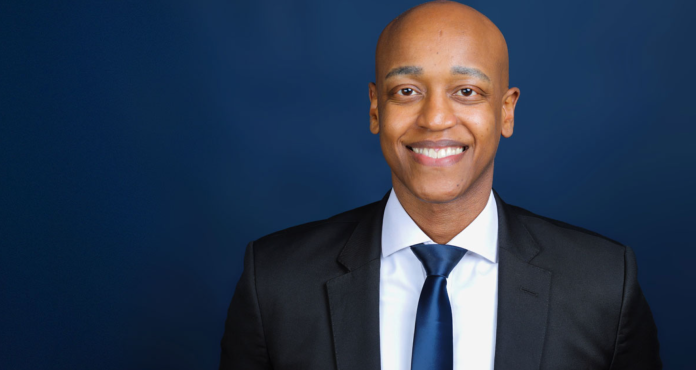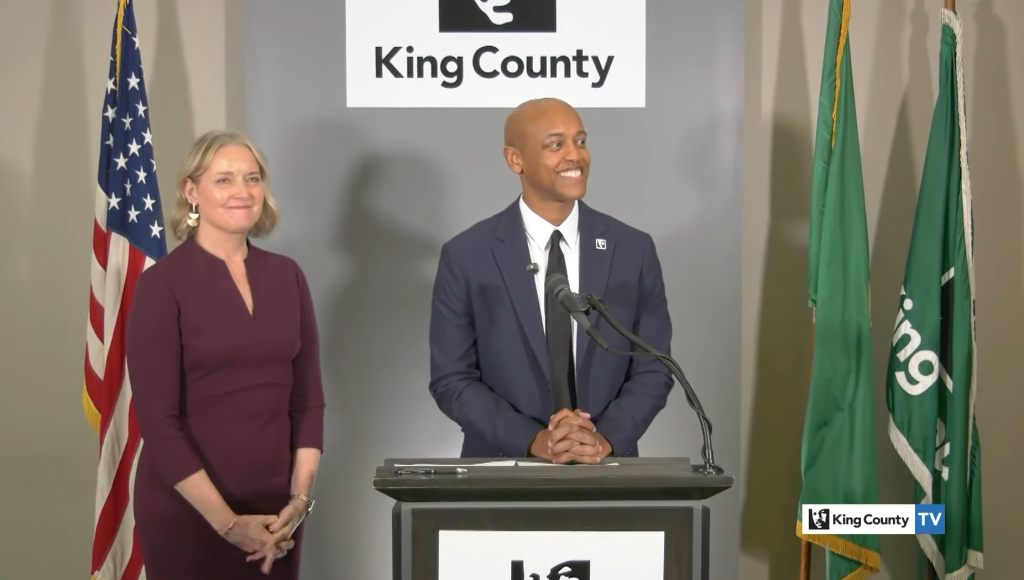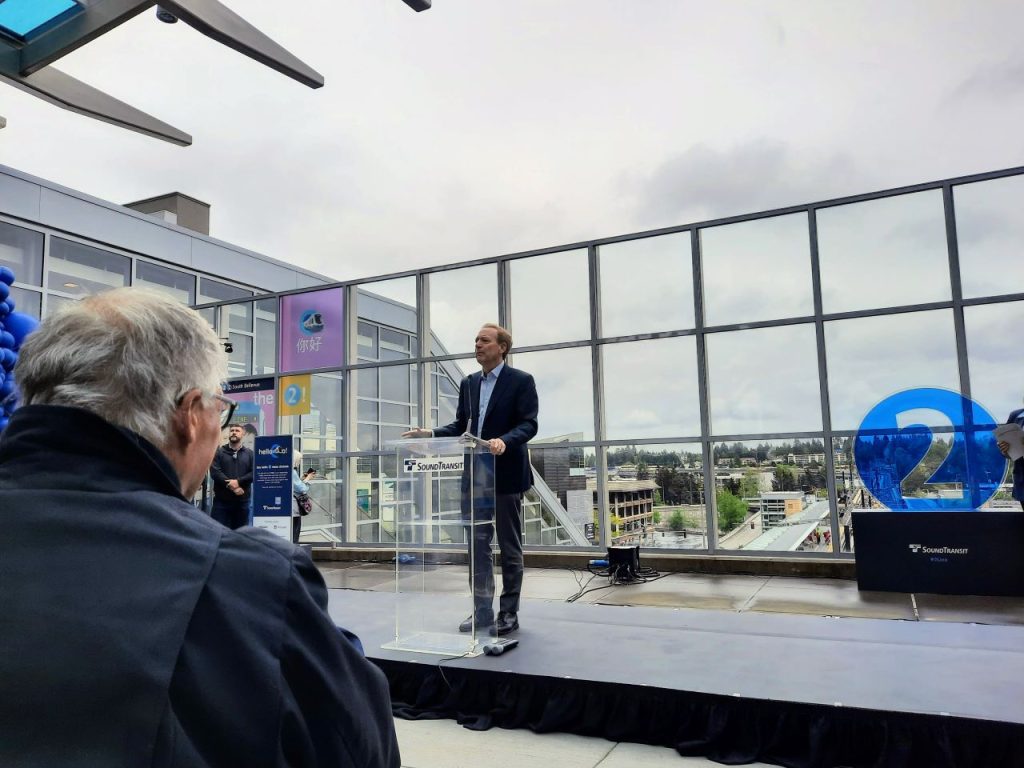
King County’s next Executive laid out his vision for a lightning-fast transition this week as he prepares to take office as the county’s first new leader elected in more than 15 years. Girmay Zahilay’s announcement came on the heels of a concession from his general election opponent — fellow County Councilmember Claudia Balducci — late last week. Zahilay won nearly 54% of the vote.
Due to former County Executive Dow Constantine’s early departure from office this past spring to become Sound Transit’s CEO, Zahilay has a much shorter runway than most new elected officials, who genearlly take over in January. Zahilay held his transition press conference with Interim Executive Shannon Braddock, from whom he will be taking over following the certification of the election results on November 25. He has laid out of a vision of the “four B’s”:
- Breaking the cycle of homelessness, addiction, and incarceration in King County,
- Building more housing, child care, and transit infrastructure,
- Boots on the ground to make county government visible to more residents, and
- Better government that is more transparent and accountable.

In his remarks Monday, Zahilay put the issue of housing production front-and-center as part of that ‘building’ agenda. While the majority of the housing permitted in the county is built within cities and towns, where county government doesn’t directly control land use regulations, the County does play a significant role in steering regional planning and subsidizing below-market-rate housing.
“We will prioritize building the infrastructure needed to meet the demands of our growing population. We believe that more supply creates more affordability,” Zahilay said. “That means increasing the supply of housing, childcare, transit and business opportunities by doing things like accelerating permitting timelines, investing public dollars in our infrastructure and coordinating more effectively across the region and across sectors.”
The idea of increasing the pace of construction on affordable housing was a central campaign platform for Zahilay, after he put forward a proposal in 2024 to consider utilizing the county’s excess bonding capacity to create more workforce housing. But a follow-up report released this year by Braddock’s office spelled out the limits of that idea, with additional revenue almost certainly needed to scale up the number of units that the county builds. With few direct revenue sources available to the county — King County can’t level a B&O tax, capital gains tax, nor a payroll expense tax — funding will likely remain Zahilay’s biggest limiting factor.
Zahilay affirmed his support for ramping up housing production across the county, citing a recent Seattle Times story noting that King County is falling behind its own goals for creating subsidized affordable homes.
“I think we have to do a much better job of keeping up the supply that is needed for this growing population. The last estimates that I heard showed that we need hundreds of thousands of more homes — more homes in general, from market-rate housing to affordable housing, by 2044,” Zahilay said. “I will make sure that we’re working closely with our state partners, with our regional partners, to make sure that we’re making it easier to build, that we’re getting the revenue that we need to invest in more housing, and making sure that we’re truly prioritizing this issue.”
Following the model of Governor Bob Ferguson (one of his most high-profile endorsers), Zahilay’s announcement included a 100-person transition committee. The mega-committee is being led by four co-chairs: ex-Seahawk football star Doug Baldwin, MLK Labor Council head Katie Garrow, the Seattle Indian Health Board CEO Esther Lucero, and Microsoft president Brad Smith.
The fact that Smith was tapped for the role is a clear gesture of good will toward King County’s business community, but it remains to be seen whether that gesture will pay dividends. Smith has been a major booster of infrastructure investments across the region, including the expanding Sound Transit network and building Cascadia high-speed rail, but has been highly critical of moves by Washington policymakers to reform the state’s regressive tax system.
This fall, Smith lambasted the Washington legislature for moves it took to balance the state budget earlier in the year, despite the fact that many of the new revenue sources contemplated — like a wealth tax — did not advance across the finish line, resulting in fairly substantial cuts to state services.

Among the longer list of transition committee members are some folks that might prompt a raised eyebrow on the county’s progressive left, including Kemper Development‘s John Carlson, Mercer Island Mayor Salim Nice, and Federal Way Mayor Jim Ferrell. Ultimately, many of the committee members have something in common: out of the 12 sitting elected officials included, only one — State Representative Nicole Macri — hadn’t endorsed Zahilay during this year’s campaign.
Despite the fact that Zahilay will oversee the state’s largest transit agency in King County Metro, transit and transportation groups aren’t heavily represented on the transition committee. Retired Metro General Manager Terry White did make the list, but representatives of groups like Transportation Choices Coalition, Washington Bikes, and Amalgamated Transit Union 587 didn’t. Many of those groups endorsed Balducci, who they saw as having a stronger record on transportation issues. That would seem to be a reason to invite those groups into your transition team, and not shut them out.
Seattle Councilmember Alexis Mercedes Rinck (who just won her own race in a landslide) did make the transition team, and could serve as a conduit to the transit advocacy community. Recently, Rinck joined with transit advocates to launch a Better Bus Lanes campaign, pushing to upgrade three of Seattle’s busiest bus corridors.
My guy Girmay doesn’t only take the bus, he wants to work with me to make them faster and more reliable! Grateful for his partnership on this to deliver on better transit service!
— AMR – Alexis Mercedes Rinck (@alexis4seattle.bsky.social) October 28, 2025 at 8:06 PM
[image or embed]
The transition team’s subcommittees are expected to submit their final recommendations by the week of December 12. Zahilay encouraged county residents to apply for a position in county government, and to share their ideas for how to improve its operation, at his transition website.
“This is our moment to reset, to unite across cities, sectors and communities, and to build the partnerships that real progress demands to the people of King County,” Zahilay said. “Thank you for your trust. I will lead with integrity, listen to every viewpoint, and measure success by the real outcomes that we are able to deliver safer communities, more affordable housing, better health and a government that earns your confidence. Every day, together, we will reset the region and build a King County that works for all of us.”
Disclosure: The Urbanist Election Committee (on which I serve) endorsed Balducci for King County Executive. Also note that Zahilay tapped Jazmine Smith, Futurewise’s advocacy director, for the transition committee. Outside of her Futurewise work, Smith also co-chaired The Urbanist Election Committee and serves on The Urbanist Board of Directors.
Ryan Packer has been writing for The Urbanist since 2015, and currently reports full-time as Contributing Editor. Their beats are transportation, land use, public space, traffic safety, and obscure community meetings. Packer has also reported for other regional outlets including BikePortland, Seattle Met, and PubliCola. They live in the Capitol Hill neighborhood of Seattle.


